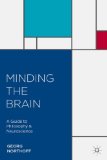June 9, 2014

The Escape of the Mind by Howard Rachlin (Oxford University Press, 2014)
(kindle ed.), (amazon.co.uk), (UK kindle ed.)
Book description from the publisher:
The Escape of the Mind is part of a current movement in psychology and philosophy of mind that calls into question what is perhaps our most basic, most cherished, and universally accepted belief–that our minds are inside of our bodies. Howard Rachlin adopts the counterintuitive position that our minds, conscious and unconscious, lie not where our firmest (yet unsupported) introspections tell us they are, but in how we actually behave over the long run. Perhaps paradoxically, the book argues that our introspections, no matter how positive we are about them, tell us absolutely nothing about our minds. The name of the present version of this approach to the mind is “teleological behaviorism.”
The approaches of teleological behaviorism will be useful in the science of individual behavior for developing methods of self-control and in the science of social behavior for developing social cooperation. Without in any way denigrating the many contributions of neuroscience to human welfare, The Escape of the Mind argues that neuroscience, like introspection, is not a royal road to the understanding of the mind. Where then should we look to explain a present act that is clearly caused by the mind? Teleological behaviorism says to look not in the spatial recesses of the nervous system (not to the mechanism underlying the act) but in the temporal recesses of past and future overt behavior (to the pattern of which the act is a part).
But scientific usefulness is not the only reason for adopting teleological behaviorism. The final two chapters on IBM’s computer, Watson (how it deviates from humanity and how it would have to be altered to make it human), and on shaping a coherent self, provide a framework for a secular morality based on teleological behaviorism.
Google Books preview:
Comments (0)
- new books,philosophy of mind
May 25, 2014

Minding the Brain: A Guide to Philosophy and Neuroscience by Georg Northoff (Palgrave Macmillan, 2014)
(amazon.co.uk)
Book description from the publisher:
This book explores how the relationship between philosophy and the brain can inform neuroscience, the mind-brain problem and debates about consciousness. Written in a lively style with extensive pedagogy to explain complex concepts, this is interesting reading for students and researchers of psychology, neuroscience and philosophy.
Table of Contents:
Introduction
PART I: MIND AND BRAIN – FROM PHILOSOPHY THROUGH NEUROSCIENCE TO NEUROPHILOSOPHY
1. Philosophy and the Mind – Philosophy of Mind and Phenomenology
2. Philosophy and Science – Naturalism
3. Mind, Brain and Science – Psychology and Neuroscience
4. Brain and Philosophy – Neurophilosophy
PART II: MIND-BRAIN PROBLEM – FROM PHILOSOPHY OF MIND TO PHILOSOPHY OF BRAIN
5. Mental Approaches to the Mind-brain Problem
6. Physical and Functional Approaches to the Mind-brain Problem
7. Non-mental and Non-physical Approaches to the Mind-brain Problem
8. Brain-based Approaches to the Mind-brain Problem
PART III: PHILOSOPHY OF PSYCHOLOGY AND NEUROSCIENCE – FROM EXPLANATION OF MIND TO EXPLANATION OF BRAIN
9. Philosophy of Psychology – Personal Versus Subpersonal Levels of Explanation
10. Philosophy of Psychology – Mind and Meaning
11. Philosophy of Neuroscience – Explanations, Concepts, and Observer in Neuroscience
12. Philosophy of Brain – Characterization of the Brain
PART IV: NEUROPHILOSOPHY OF CONSCIOUSNESS – FROM MIND TO CONSCIOUSNESS
13. Arguments against the Reduction of Consciousness to the Brain
14. Neural Correlates of Consciousness (NCC)
15. Neural Predispositions of Consciousness (NPC)
16. Conceptual, Phenomenal, and Methodological Issues in the Investigation of Consciousness
PART V: NEUROPHILOSOPHY OF SELF – FROM CONSCIOUSNESS TO SELF
17. Brain and Self
18. Brain and Self-consciousness
19. Abnormalities of Self and Brain in Psychiatric Disorders
20. Brain and Intersubjectivity
Epilogue: Is the Brain a Door Opener?
See also: Author’s website
Comments (0)
- consciousness,new books,philosophy of mind,self
May 3, 2014

Advances in Experimental Philosophy of Mind, ed. by Justin Sytsma (Bloomsbury, 2014)
(kindle ed.), (amazon.co.uk), (UK kindle ed.)
Book description from the publisher:
The past decade has witnessed an exciting (and controversial) new approach to philosophy: Experimental philosophers aim to supplement, and perhaps to supplant, traditional philosophical approaches by employing empirical methods from the social sciences. In Advances in Experimental Philosophy of Mind, leading experimental philosophers apply these methods to questions about the nature of the mind, the self, consciousness, moral judgment, and concepts.
By bringing empirical methods to bear on key issues, Advances in Experimental Philosophy of Mind pushes the debates forward, casting new insight on perennial problems. This is an essential resource for professors, graduate students, and advanced undergraduates interested in either philosophy of mind or the burgeoning field of experimental philosophy.
Google Books preview:
Comments (0)
- new books,philosophy of mind
April 23, 2014

A Sentimentalist Theory of the Mind by Michael Slote (Oxford University Press, USA, 2014)
(amazon.co.uk)
Book description from the publisher:
Michael Slote argues that emotion is involved in all human thought and action on conceptual grounds, rather than merely being causally connected with other aspects of the mind. This kind of general sentimentalism about the mind goes beyond that advocated by Hume, and the book’s main arguments are only partially anticipated in German Romanticism and in the Chinese philosophical tendency to avoid rigid distinctions between thought and emotion. The new sentimentalist philosophy of mind Slote proposes can solve important problems about the nature of belief and action that other approaches — including Pragmatism — fail to address.
In arguing for the centrality of emotion within philosophy of the mind, A Sentimentalist Theory of the Mind continues the critique of rationalist philosophical views that began with Slote’s Moral Sentimentalism (OUP, 2010) and continued in his From Enlightenment to Receptivity (OUP, 2013). This new book also delves into what is distinctive about human minds, arguing that there is a greater variety to ordinary human motives than has been recognized and that emotions play a central role in this complex psychology.
Comments (0)
- new books,philosophy of mind
April 10, 2014

New Waves in Philosophy of Mind, ed. by Mark Sprevak and Jesper Kallestrup (Palgrave Macmillan, 2014)
(amazon.co.uk)
Book description from the publisher:
Philosophy of mind is one of the core disciplines in philosophy. The questions that it deals with are profound, vexed and intriguing. This volume of 15 new cutting-edge essays gives young researchers a chance to stir up new ideas. The essays cover a wide range of topics, including the nature of consciousness, cognition, and action. A common theme in the essays is that the future of philosophy of mind lies in judicious use of resources from related fields, including epistemology, metaphysics, philosophy of language, philosophy of science, and cognitive neuroscience. Approaches that the researchers explore in this volume range from the use of armchair conceptual analysis to brain scanning techniques.
Google Books preview:
See also: Online conference at Google Groups (papers & discussion)
Comments (0)
- new books,philosophy of mind







